
The Royal Albert Hall is a concert hall on the northern edge of South Kensington, London, England. It has a seating capacity of 5,272.

Wolverhampton Civic Hall is a music venue in Wolverhampton, West Midlands, England. It has been one of the most notable live music venues in the county for several decades. It is part of a complex branded as University of Wolverhampton at The Halls, Wolverhampton including University of Wolverhampton at The Civic Hall, University of Wolverhampton at Wulfrun Hall and the Slade Rooms. The complex is owned by City of Wolverhampton Council, operated by AEG Presents and is a Grade II listed building.
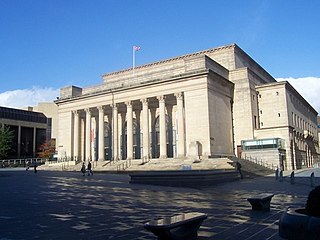
Sheffield City Hall is a Grade II* listed building in Sheffield, England in Barker's Pool, one of the city's central squares. It was built and is owned by Sheffield City Council but is now managed by the Sheffield City Trust, under a 99-year lease and is operated by Sheffield International Venues as a venue for concerts and other events in its various rooms.

Rock City is a music venue and nightclub located in Nottingham, England. It is owned by venue operator and concert promoter DHP Family.
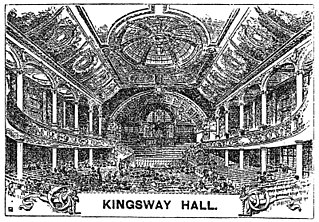
The Kingsway Hall in Holborn, London, was the base of the West London Mission (WLM) of the Methodist Church, and eventually became one of the most important recording venues for classical music and film music. It was built in 1912 and demolished in 1998. Among the prominent Methodists associated with the Kingsway Hall was Donald Soper, who was Superintendent Minister at the West London Mission from 1936 until his retirement in 1978.

Bristol Beacon, previously Colston Hall, is a concert hall and Grade II listed building on Colston Street, Bristol, England. It is owned by Bristol City Council. Since 2011, it has been managed by Bristol Music Trust.

The Brighton Dome is an arts venue in Brighton, England, that contains the Concert Hall, the Corn Exchange and the Studio Theatre. All three venues are linked to the rest of the Royal Pavilion Estate by a tunnel to the Royal Pavilion in Pavilion Gardens and through shared corridors to Brighton Museum. The Brighton Dome is a Grade I listed building.

Cheltenham Town Hall is an early-20th century assembly rooms in Cheltenham, England. Unlike most town halls, it is a public venue and not the seat of the borough council, which is housed in the nearby Municipal Offices. It is a Grade II listed building.

John Keys MA (Oxon), LRAM, ARCM, Hon FGCM is a British and international organist.

Watford Colosseum is an entertainment venue in Watford, Hertfordshire, England. Established in 1938, as the Assembly Rooms for Watford Town Hall, the complex was extended in 2011 with improvements which included new meeting spaces, a new restaurant and new bar facilities.

Charles Lloyd was a pipe organ builder based in Nottingham who flourished between 1859 and 1908.
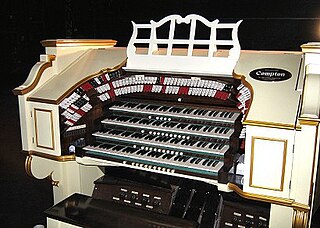
John Compton (1876–1957), born in Newton Burgoland, Leicestershire, England, was a pipe organ builder. His business based in Nottingham and London flourished between 1902 and 1965.

The Freemasons' Tavern was established in 1775 at 61–65 Great Queen Street in the West End of London. It served as a meeting place for a variety of notable organisations from the 18th century until it was demolished in 1909 to make way for the Connaught Rooms.

James Jepson Binns was a pipe organ builder based in Leeds, West Yorkshire, England.

The Albert Hall is a music venue in Manchester, England.
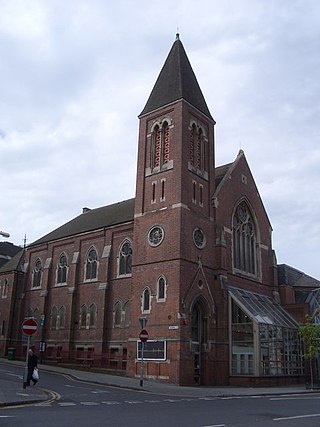
Parliament Street Methodist Church is a Methodist church on Parliament Street in Nottingham.
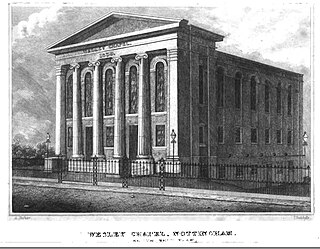
Broad Street Wesleyan Chapel was a former Methodist chapel in Nottingham from 1839 to 1954. The building is now occupied by the Broadway Cinema.
William Herbert Higginbottom JP was an architect based in Nottingham.

Middlesbrough Town Hall is a municipal facility located in Albert Road in Middlesbrough, North Yorkshire, England. It is a Grade II* listed building.

The Elite Picture Theatre, Nottingham was a cinema open from 1921 to 1977 in Nottingham.























